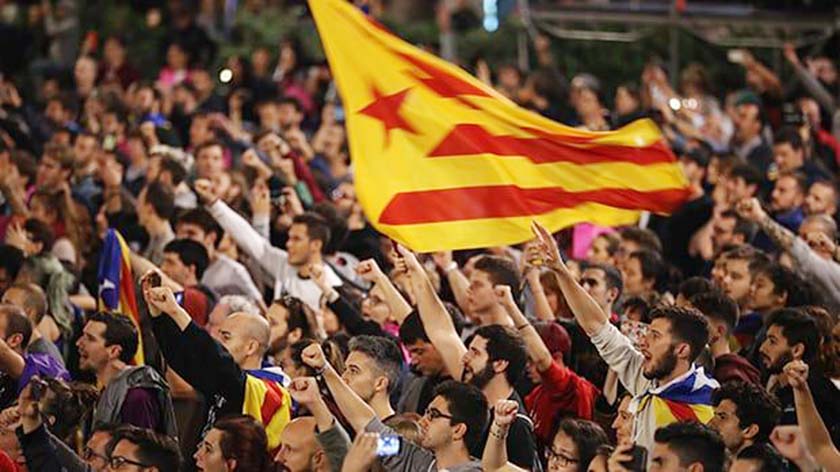
Reuters, Barcelona :
Barcelona metro stations were closed, pickets blocked main roads and civil servants walked out on Tuesday in response to a strike called by pro-independence groups after hundreds were injured in a Spanish police crackdown on a banned independence referendum.
The stoppages, originally billed as a region-wide general strike but disavowed by the country’s largest unions, affected the public sector, public transport and basic services.
Normally busy metro stations in Barcelona were deserted as services were cut back sharply, pickets blocked traffic on Gran Via street and traffic on six major highways in the region was disrupted by protests.
Elsewhere, the response to the strike call was patchy with some shops, supermarkets and cafes open and some closed. The Boqueria market in Barcelona was almost empty.
Pro-independence groups and trade unions in Catalonia called a general strike for Tuesday after Spanish police forcibly tried to close polling stations on Sunday after a referendum on Catalan independence from Spain was banned by the constitutional court.
Scenes of armored Spanish police swinging truncheons and firing rubber bullets at peaceful voters have been widely condemned, with the European Union calling for talks to break the stalemate between Madrid and Barcelona.
On Sunday, Prime Minister Mariano Rajoy said the ballot had failed, while Catalan leader Carles Puigdemont vowed to continue with the independence process after millions voted to leave.
Spain’s two largest unions on Monday said they would not take part in the general strike and also called for dialogue between the central government and Catalonia, criticizing both the call for independence and the heavy-handed police tactics.
“The UGT and the CCOO clearly state that we do not back this position or this political strategy. We are not calling a general strike for Oct. 3,” they said on Monday.
However, many services under the control of the Catalan government did see some stoppages, with public transport running at around 40 percent, according to reports, while port workers and civil servants also walked out.
Entrances to some government offices were blocked by crowds protesting in favor of independence.
Large numbers of Catalans are expected to observe a general strike on Tuesday to condemn police violence at a banned weekend referendum on independence, as Madrid comes under growing international pressure to resolve its worst political crisis in decades.
Flights and train services could be disrupted as well as port operations, after unions called for the stoppage to “vigorously condemn” the police response to the poll, in which Catalonia’s leader said 90 percent of voters backed independence from Spain.
Barcelona’s public universities are expected to join the strike, as is the contemporary art museum, football club FC Barcelona and the Sagrada Familia, the basilica designed by Antoni Gaudi and one of the city’s most popular tourist sites.
“I am convinced that this strike will be widely followed,” Catalan leader Carles Puigdemont said ahead of the protest.
The central government has vowed to stop the wealthy northeastern region, which accounts for a fifth of Spain’s GDP, breaking away from Spain and has dismissed Sunday’s poll as unconstitutional and a “farce”.
Violent scenes played out in towns and cities across the region on Sunday as riot police moved in on polling stations to stop people from casting their ballots, in some cases charging with batons and firing rubber bullets to disperse crowds.
UN rights chief Zeid Ra’ad Al Hussein said he was “very disturbed” by the unrest while EU President Donald Tusk urged Madrid to avoid “further use of violence”.
The European Parliament will hold a special debate on Wednesday on the issue.
“We call on all relevant players to now move very swiftly from confrontation to dialogue. Violence can never be an instrument in politics,” European Commission spokesman Margaritis Schinas said, breaking weeks of virtual EU silence on the Catalan issue.
Residents in many cities briefly stopped work at midday on Monday and descended onto the streets in silent, solemn protest.
In Barcelona, municipal police said about 15,000 people stopped traffic as they rallied, many draped in the blue, yellow and red Estelada flag used by Catalan separatists, shouting “the streets will always be ours”.
“This was the norm under Franco!” the crowd chanted, referring to former dictator Francisco Franco whose 1939-75 regime repressed Catalan language and culture.
The government of Prime Minister Mariano Rajoy held emergency talks after Puigdemont declared Sunday that Catalonia had “won the right to an independent state”.
Puigdemont has appealed for international mediation to help solve the crisis and called for police deployed to Catalonia from other parts of Spain for the vote to be removed.

